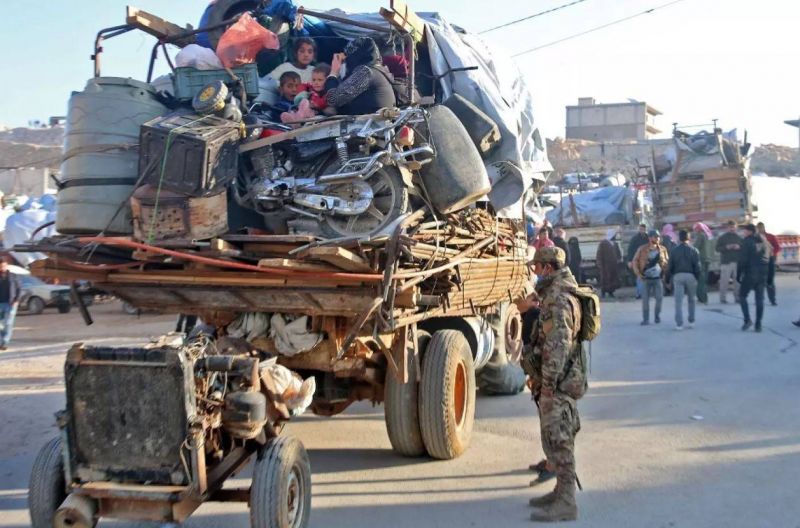
Syrian refugees prepare to leave Lebanon for Syrian territory through the Wadi Hamid border crossing in Ersal, on Oct. 26, 2022. (Credit: AFP archive photo)
In a new report published on Thursday, Human Rights Watch (HRW) accuses the Lebanese authorities of arbitrarily detaining, torturing and forcibly returning Syrians to their country in recent months, including opposition activists and army defectors.
Between January and March 2024, HRW documented the forcible return of a Syrian army defector and an opposition activist by the Lebanese army and General Security, the Lebanese security agency that controls the entry and residence status of foreigners. In another case, army intelligence reportedly briefly detained and tortured a Syrian who had taken part in a demonstration in solidarity with the women of Gaza.
Despite deportation orders and an increasingly hostile environment, exacerbated by Lebanese officials scapegoating the refugee population, many Syrian migrants are struggling to stay in Lebanon. According to the Lebanese government, some 1.5 million Syrians live in Lebanon, representing almost a third of the country's population. Even so, only 784,884 Syrians were registered as refugees with the Office of the United Nations High Commissioner for Refugees (UNHCR) in January 2024, the Lebanese authorities called on the UN organization to suspend registrations in 2015.
13,772 people expelled in 2023
Last March, a UN report said that the UNHCR was aware of "13,772 people expelled from Lebanon or turned back at the border with the Syrian Arab Republic in around 300 incidents in 2023," including 600 people on Nov. 8. It also notes that "local authorities in 27 municipalities have taken measures limiting the ability of displaced Syrian refugees in southern Lebanon to find alternative shelter," against a backdrop of cross-border hostilities between Israel and Lebanese and Palestinian armed groups since October 2023, in the wake of the war in Gaza.
"For years, the Lebanese authorities have imposed discriminatory practices against Syrians in the country in order to force them to return to Syria, which remains unsafe," says Ramzi Kaiss, Lebanon researcher at HRW. "Arbitrary arrest, torture or deportation of Syrians who face a well-founded risk of persecution if returned to their country are additional stains on Lebanon's refugee record," he stresses.
Since the assassination of Lebanese Forces party leader Pascal Sleiman on April 7, 2024, allegedly by a group of Syrian nationals according to the Lebanese army, "Lebanese ministers and politicians have reiterated their calls for the return of Syrians [to their country], fueling the ongoing violence against them," denounces HRW. Syrians were even reportedly beaten in April and faced demands to leave their homes across Lebanon, with governorates and municipalities imposing discriminatory curfews, illegally restricting Syrians' right to freedom of movement.
Faleh, Waer, Aatr
In its report, HRW says it spoke to Mohammad Sablouh, head of the legal support program at the Cedar Center for Legal Studies and a lawyer representing three Syrians, and examined correspondence between the lawyer and the Lebanese judicial authorities. Two of his clients, Rifaat Faleh and Moaz Waer, were deported to Syria between January and March, while Yassine Aatr, a Syrian opposition activist, is currently the subject of a deportation order from the General Security. HRW claims to have also spoken to relatives of Aatr and Faleh, who asked to remain anonymous for security reasons, as well as another lawyer, Diala Shehadeh, who represents a Syrian arrested by Lebanese military intelligence and allegedly tortured.
The deportation of thousands of Syrians, including unaccompanied children, to Syria in 2023 is a violation of Lebanese law and Lebanon's international human rights obligations, the international organization stresses. The expulsions of Syrian opposition activists and army defectors violate Lebanon's obligations as a party to the UN Convention against Torture and under the principle of non-refoulement under customary international law, which prohibits the forcible return of people to countries where they run a clear risk of torture or persecution.
It is against this backdrop that HRW calls on the governments that fund the Lebanese security forces and General Security to demand that they put an end to illegal deportations and other violations of Syrians' rights. The Lebanese army and General Security are targeting people who have already suffered far too much and who could face even more severe punishment from the Syrian authorities if they were sent back to their country," says Kaiss. Donor countries providing funds and other forms of assistance to the Lebanese security and military services must ensure that funds or equipment provided to Lebanon are not used to commit human rights violations."
This article originally appeared in French in L'Orient-Le Jour.